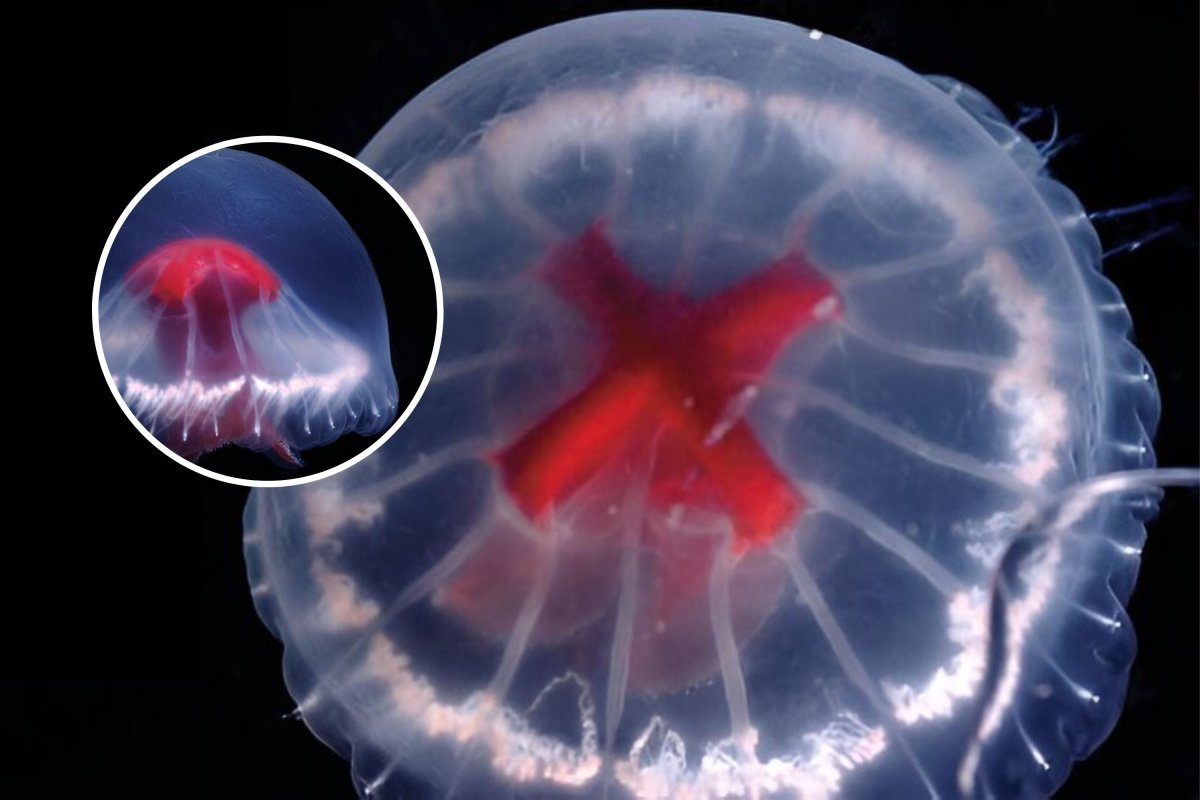A new species of jellyfish has been discovered deep below the waves, and it may possess venoms that we have never seen before.
The new species, named Santjordia pagesi, was discovered at a depth of 2,664 feet near Japan's Ogasawara Islands, floating around a deep-sea volcano known as the Sumisu Caldera.
The new jellyfish, which has been sighted only twice, is an umbrella-shaped medusa species, measuring around 4 inches across and with a red cross in the center of its body, according to a paper in the journal Zootaxa. This inspired its common name: the St. George's Cross Medusa.

The jellyfish was captured from the depths and had its DNA analyzed, which revealed that it was so distantly related to all other species of jellyfish that scientists needed to designate not only a new species name but a whole new genus and subfamily.
"We discovered and described a new species of deep-sea jellyfish, which has currently only ever been recorded from inside a single, mineral-rich undersea volcanic caldera," paper co-author Dhugal Lindsay told Newsweek.
"It was so different to anything else yet described that we needed to erect not only a new genus but also a new subfamily to contain it
Lindsay is a researcher at the Japan Agency for Marine-Earth Science and Technology.
Because this new species is so evolutionarily different from other species that scientists have discovered, they suggest it may contain a cocktail of venoms drastically different in chemical makeup from anything previously seen.
"This jellyfish is most certainly venomous, as the tentacles were covered in stinging cells. No work has yet been done on its venom, but if funding were available we would love to look into it. All venoms are possible medicines and since this species is so different from others, one could surmise that the venom could be novel," Lindsay said.
The St. George's Cross Medusa is mostly transparent, with the exception of its characteristic red cross marking, which is thought to make it harder for predators to spot any bioluminescent food the jellyfish has inside its belly.
The jellyfish was first spotted in 2002 during a research mission to the Sumisu Caldera using the remotely operated vehicle (ROV) Hyperdolphin, which captured the specimen and allowed for DNA analysis.
However, the species was not seen again until 2020, when it was filmed by the KM-ROV but evaded capture. It's unusual for a new species to be confirmed after the collection of only a single specimen, as several of the animals are usually studied first. However, because of the apparent rarity of S. pagesi, it was designated a new species after a single specimen was captured and another observed.
"Usually, at least two specimens of a species are needed to describe a new species, though exceptions are made. We were able to ascertain from a second individual that was sampled in 2020, that our holotype specimen was not a mutant and could safely be used to describe the species," Lindsay said.

The researchers hope that further expeditions to the deep-sea volcano will yield more sightings of the rare jellyfish.
"We will be undertaking more surveys inside volcanic calderas in March and again in April. Watch this space for more discoveries," Lindsay said.
Do you have a tip on a science story that Newsweek should be covering? Do you have a question about jellyfish? Let us know via science@newsweek.com.
Update 2/7/2024 12:58 p.m. ET: This article was updated with comment from Dhugal Lindsay.
Uncommon Knowledge
Newsweek is committed to challenging conventional wisdom and finding connections in the search for common ground.
Newsweek is committed to challenging conventional wisdom and finding connections in the search for common ground.
About the writer
Jess Thomson is a Newsweek Science Reporter based in London UK. Her focus is reporting on science, technology and healthcare. ... Read more
To read how Newsweek uses AI as a newsroom tool, Click here.





